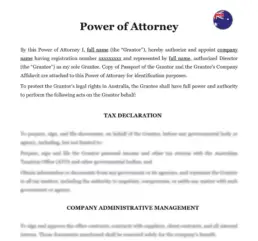The Importance of receiving Legal Authorization
A Power of Attorney is a legal document that grants one person (the agent) the authority to act on behalf of another person (the principal) in legal or financial matters. This guide explores the scenarios in Australia where having a legal authorization is essential, emphasizing the significance of this document for both individuals and businesses.
Understanding Power of Attorney
A Power of Attorney is a powerful legal tool that provides flexibility and security in managing various aspects of life and business.
1. Definition: A Power of Attorney is a written authorization to represent or act on another’s behalf in private affairs, business, or legal matters.
2. Types: In Australia, there are several types of legal authorization, including General, Enduring, and Medical Powers of Attorney. Each serves different purposes and remains valid under specific conditions.
3. Legal Framework: The framework governing legal authorization varies by state and territory, so it’s important to understand local regulations.
Personal Financial Management
Managing personal finances can become challenging due to illness, absence, or incapacity.
1. Banking: A legal authorization allows an agent to handle banking transactions, including deposits, withdrawals, and account management. Learn more about properly documenting rental payments in Australia.
2. Investments: The agent can manage investments, buy or sell property, and oversee financial portfolios.
3. Bill Payments: Ensure bills are paid on time, avoiding late fees and service interruptions.
4. Taxes: The agent can file tax returns and handle related correspondence with tax authorities.
Business Operations
For business owners, a legal authorization is vital for continuity and smooth operation.
1. Business Transactions: The agent can conduct day-to-day business transactions, enter into contracts, and make business decisions. This is particularly important when you need to hire a property manager or oversee other critical operations.
2. Financial Management: Oversee financial matters, including payroll, expenses, and business banking.
3. Legal Representation: Represent the business in legal matters, ensuring compliance and protecting business interests.
4. Emergency Situations: In case of illness or absence, the agent can ensure business operations continue without disruption.
Real Estate Transactions
Real estate transactions often require legal authorization for smooth execution.
| ➤ Buying and Selling Property: An agent with Power of Attorney can negotiate, sign contracts, and complete transactions on behalf of the principal. |
| ➤ Leasing: Manage rental properties, including signing lease agreements and handling tenant issues. |
| ➤ Property Management: Oversee property maintenance, repairs, and other management tasks. |
| ➤ Mortgage Management: Handle mortgage payments and related financial arrangements. |











